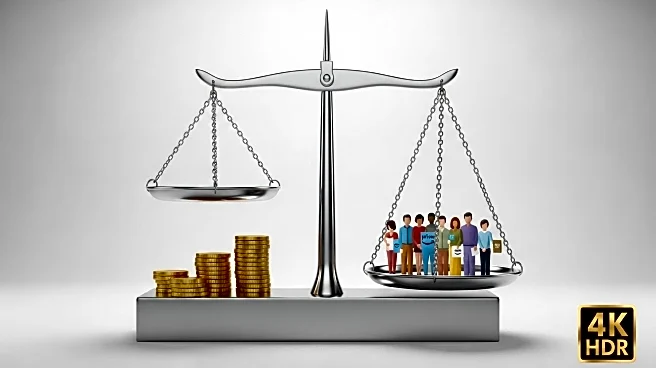What's Happening?
Amazon has reached a settlement with the Federal Trade Commission (FTC) to pay $1.5 billion in refunds to Prime subscribers, as part of a larger $2.5 billion agreement. The settlement addresses allegations that Amazon used deceptive practices to enroll customers in its Prime subscription service and made it difficult for them to cancel. The FTC's investigation revealed that Amazon employed sophisticated subscription traps, manipulating consumers into signing up for Prime. The settlement includes a $1 billion fine paid to the government, marking one of the largest settlements in U.S. history. Amazon will automatically refund $51 to customers who signed up through deceptive means and used the service minimally. Those who used Prime more frequently will receive forms to apply for refunds. This settlement allows Amazon to avoid a jury trial in Seattle, which could have resulted in negative publicity for the company.
Why It's Important?
The settlement is significant as it highlights ongoing scrutiny of Big Tech companies by U.S. regulators. It underscores the government's commitment to holding companies accountable for deceptive practices, particularly in subscription services. The $2.5 billion settlement is one of the largest in U.S. history, reflecting the seriousness of the allegations against Amazon. This case is part of a broader trend of legal actions against major technology firms, including Google, Meta, and Apple, for various antitrust and privacy violations. The settlement also raises questions about the adequacy of current regulations in protecting consumers from misleading subscription practices. While the refunds provide some relief to affected consumers, antitrust advocates argue that the penalties are insufficient to address the harm caused by Amazon's practices.
What's Next?
The settlement may prompt further regulatory scrutiny of subscription services and their cancellation processes. The FTC's actions could lead to more stringent regulations to ensure transparency and fairness in subscription terms. Consumer advocates may push for stronger enforcement of existing laws to prevent deceptive practices. Additionally, other companies with similar subscription models might face increased pressure to simplify their cancellation processes to avoid legal challenges. The settlement could also influence ongoing and future antitrust cases against other tech giants, as regulators continue to address monopolistic behaviors and consumer rights.
Beyond the Headlines
The settlement raises ethical questions about corporate responsibility and consumer protection. It highlights the need for companies to prioritize transparency and fairness in their business practices. The case also reflects broader concerns about the power and influence of Big Tech companies in the market. As regulators and consumer advocates push for stricter oversight, companies may need to reassess their strategies to align with evolving legal and ethical standards. The settlement could lead to long-term shifts in how subscription services are marketed and managed, potentially benefiting consumers through improved access and control over their subscriptions.








